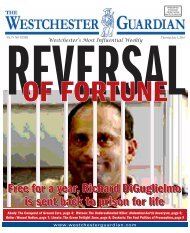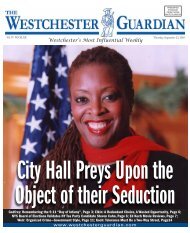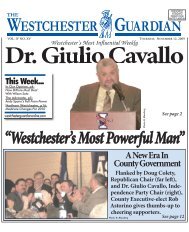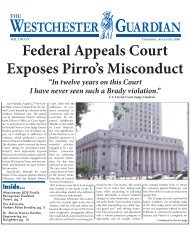November 15, 2012 - WestchesterGuardian.com
November 15, 2012 - WestchesterGuardian.com
November 15, 2012 - WestchesterGuardian.com
- No tags were found...
Create successful ePaper yourself
Turn your PDF publications into a flip-book with our unique Google optimized e-Paper software.
Page 10 THE WESTCHESTER GUARDIAN THURSDAY, november <strong>15</strong>, <strong>2012</strong>HISTORYJack Reed and Louise BryantContinued from page 9Reed and Bryant had wiredSenator Overman offering to testify aswitnesses but received no reply.On Sunday afternoon, February2, Louise was in Washington for anappearance at Poli’s Theater at <strong>15</strong>thStreet and Pennsylvania Avenue. Afterher talk, she remained in Washingtonand managed to get arrested in frontof the White House. She was releasedfollowing a brief hunger strike.Louise attended the hearings andlistened to a series of friendly witnesses.During a recess she confronted thechairman and demanded to be heard.He promised to tell her the next daywhen she would be called to testify, butfailed to keep his promise.Only after she stood up during ahearing, identified herself and publiclydemanded that her testimony bescheduled was she called before theOverman Committee. She testified fortwo days as the first unfriendly witness,starting on February 20.Bryant’s treatment during hertestimony initiated the practice ofcongressional witch-hunting thatwould culminate in the discreditedHouse Un-American ActivitiesCommittee under J. Parnell Thomasand Sen. Joe McCarthy’s ArmedServices Committee hearings in the1950s.InquisitionThroughout her testimonyOverman Committee members wereboth bullying and belligerent. Atthe outset, they grilled her at lengthabout her belief in God. Althoughshe admitted that she believed inthe sanctity of an oath, Senator Kingpressed on, stating. “A person who hasno conception of God does not haveany idea of the sanctity of an oath, andan oath would be meaningless,” heinsisted.Unsatisfied with her concessionof belief that there was a God, she wasasked by Senator Wolcott whether shebelieved “in a punishment hereafterand a reward for duty.” An exasperatedLouise Bryant responded, “Itseems to me as if I were being tried forwitchcraft. Very well, I will concede--Iconcede there is a hell.”Senator King asked Louise whereshe stayed in Washington. She toldhim that it was at the headquarters ofthe National Women’s Party, a militantsuffragist group. He asked whether shebelonged to the NWP “picket squad”that had actively picketed the WhiteHouse.She responded, “I do not knowwhat that has to do with the truthabout Russia, but I did. I believe inequality for women as well as men,even in my own country.”“We want to know somethingabout the character of the person whotestifies,” he told her, “so that we candetermine what credit to give to theirtestimony.”Under further questioning bySenator Nelson, she admitted thatshe took part in the burning of thepresident in effigy, an act for whichshe was jailed. After probing questionsabout her first and second marriages,Senator King asked if she participatedin Bolshevik meetings. She repliedthat she took notes at such meetings,as other reporters did.She was asked about Jack Reed’semployment by the Bolsheviks.Holding copies of propaganda documentsprinted in German, Louiseproudly admitted that her husbanddid a lot in Russia to bring about theabdication of the Kaiser.Senator Nelson maintained thathe wanted facts. Bryant insisted thepapers she was holding were thefacts. Nelson cautioned her: “Don’tbe so impertinent.” When spectatorsapplauded, the chairman warned thathe would clear the room if the noisewas repeated. It was and he did. Louiserefused to testify in a closed session.After about an hour, spectators wereallowed to return, with an admonitionagainst “cheering.”Senator Overman asked about herlecture at Poli’s Theater. “Its purposewas to protest against interventionin Russia.” she explained. “I, as anAmerican, believing in self-determination,cannot believe in intervention.I do not see how we can fight fordemocracy in France and against itin Siberia. I believe we ought to takeour troops out of Russia. It would bebetter for both nations to have friendlyrelations.”Senator Nelson demanded toknow whether she was “anxious” forthe Bolsheviks to remain in power.“I am anxious—” she began.“Answer my question,” SenatorNelson interrupted. “Are you anxiousto have the Bolshevik governmentthere as a permanent thing?” hethundered.Louise replied calmly, “I think theRussians ought to settle that.”He posed the question again, andshe replied, “I answered you. I said Ibelieved in self-determination.”“Self-determination at the pointof a gun?” he asked.“All governments have had to beself-determined at the point of a gun.There never has been the governmentestablished except after a war,” was herreply.When the hearing opened thenext day, Louise Bryant asked thechairman to be allowed “to speak awhole sentence before this <strong>com</strong>mitteewithout being interrupted.” Heassented.She criticized the hearings,pointing out that previous witnesseswho did not support the revolutionwere allowed to talk at length, butshe was not allowed to answer questionsfully. She had been treated like “atraitor,” she charged.Chairman Overman told herpatronizingly: “You seem to want tomake a martyr of yourself, when youhave not been treated unfairly that Ican see. You’re a woman and you donot know anything about the conductof an examination such as we have inhand here. We’re going to treat youfairly and treat you as a lady.”Louise’s answer has be<strong>com</strong>e aclassic: “I don’t want to be treated asa lady, but I want to be treated as ahuman being.”She wanted the record to showthat she believed she had been “lecturedat” and subjected to “a sort of thirddegree” by Senator Nelson. She wastold by Senator Sterling, “You were notgiven lectures. You were cross-examined.”Senator Nelson described her as“deluded,” adding, “You are young, too,and I feel sorry for you.”The chairman declared that as ajudge on the bench in Utah the senatorfrequently had before him witnesseswho were charged with having no faithin the Christian religion. Bryant counteredby asking, “How would you havetreated me if I had been a Jew?”Jack Reed followed Louise as awitness. His answers were crisp andclear. The <strong>com</strong>mittee obviously had nodesire to tangle with him, and he wasallowed to depart quickly.Back in CrotonIn April of 1919, Jack and Louiseacquired a German shepherd puppyand began gardening and laying flagstonesat the house on Mount Airy.Reed fell ill in the influenza epidemicsweeping the country and becamedelirious. “For some days he seemednot to understand anything,” Louisenoted. Getting a doctor to make housecalls or finding a nurse was impossible.A phone call to Dr. Harry Lober inNew York brought the advice “givehim aspirin and eggnog with plenty ofbrandy.”She was wife, doctor and nurseto Jack. Because the little house wascold, she moved the bed to the livingroom near the fireplace. Each day shegave him an alcohol rub, “starting withhis toes and working all over his body.”She turned him regularly to preventbedsores from developing.Widespread fear of contagionmade it futile to ask neighbors for help.Louise chopped wood and brought inarmloads of logs for the fire. Whenhe slept, she hurriedly descended intothe village for groceries and suppliesand struggled back up steep Mt. AiryRoad.Louise had ordered some trees.With a recovering Reed sitting bythe window and giving instructions,Boardman Robinson and Louiseplanted a small red hawthorn where hesuggested. She later wrote a touchingpoem about it:All the fruit-trees were in bloom.They were little girlsGoing to <strong>com</strong>munion.But the hawthorn broke my heart.It was the little sonI dreamed about and never had.As strength slowly returned, Jackbegan to dream about making his wayback to Russia where so much washappening. Louise was furious at theidea of another separation.Robert Scott is a semi-retired bookpublisher and local historian. He lives inCroton-on-Hudson, N.Y.CURRENT COMMENTARYWaiting for the Dead to Step ForwardBy LARRY M. ELKINAs a rule, dead folksare not very diligentabout exercising theirrights. Some life insurance<strong>com</strong>panies haveprofited from this tendency for a longtime, but their free ride on the backsof policy beneficiaries may be <strong>com</strong>ingto an end.American International GroupInc. and MetLife Inc. have agreed topay large settlements to beneficiariesof unclaimed life insurance policiesand to change their procedures to helpidentify policies that might otherwisego unclaimed. Under the settlements,which followed recent state reviews,AIG is expected to pay around $300million, and MetLife is expected topay about $500 million.A life insurance policy is a contractualpromise to the policy’s owner thatthe insurer will pay the designatedbeneficiary when the insured persondies. Often, the policy owner is theperson whose life is insured, whichmeans that, upon death, the owner isnot in a position to notify the insurance<strong>com</strong>pany that it is time to issue a check.Usually, the beneficiary is aware of thepolicy and will claim the death benefit,but sometimes a policy’s existence iseither unknown or overlooked.In that situation, insurers donot get to just hold on to the moneyand wait. States require unclaimed orabandoned property, including insurancebenefits, to be turned over tothem for safekeeping in the event therightful owner is later identified. NewYork state’s unclaimed insurance fundcurrently holds one uncashed policyworth $1.7 million and others of lesservalue.Once the money is in state hands,it quickly be<strong>com</strong>es available for otherpurposes. Anthony Forchino, assistantdirector at the Arizona Department ofRevenue, told The New York Timesthat the unclaimed benefit moneyhis state collects “goes into a generalfund each year until it’s claimed.”That seldom happens. Including theContinued on page 11
















